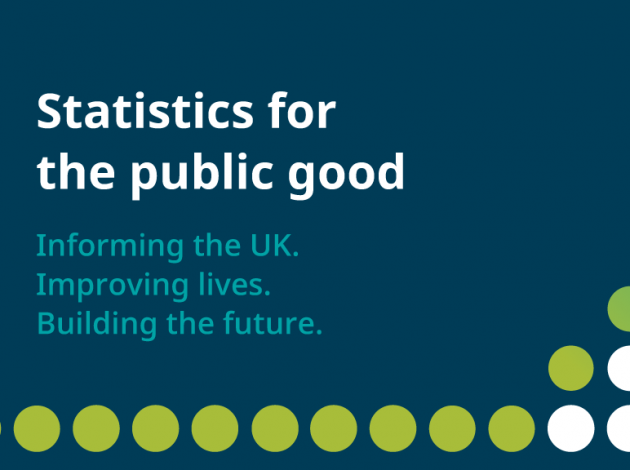In the middle of 2020, the UK Statistics Authority embarked on its new five- year strategy, “Statistics for the Public Good”. Launched at the height of the COVID-19 pandemic, the statistical system has since gone above and beyond to ensure the country has the data it needs now and in years immediately ahead. In this post Professor Sir Ian Diamond, National Statistician, reflects on how far the Office for National Statistics (ONS) and the UK Statistics Authority has come and what’s coming next.
This month I hosted an event with the Government’s Chief Scientific Advisor, Sir Patrick Vallance, alongside the leadership of the UK Statistical System. We reflected on the recent achievements of the statistical system and, more importantly, prepared for the challenges still to come.
The pandemic has demonstrated most vividly the need for fast and accurate data in order to inform crucial decisions. I’m proud to say that when the country needed them most, our teams proved that they were more than up for that challenge.
Just at the ONS, we launched a huge national study within the few weeks of the first lockdown to track infections across the country. Since then, our COVID-19 Infection Survey has remained one of the government’s key sources of information on the pandemic growing to over 400,000 participants whilst also tracking levels of vaccination and immunity in the community.
Responding to the need for faster information, we were also able to set up weekly surveys of the population looking at the impact on people’s wellbeing, their attitudes towards restrictions and understanding how businesses were coping. Colleagues across the GSS developed statistics on never before measured topics from test and trace to furlough and have developed dashboards which have provided the information for the main news story each day for over a year.
Our teams at the ONS, have been working for some time to ensure we can deliver quicker insights to help policy makers make quicker decisions. This work was turbo charged during the pandemic as more and more new types of data were drawn in to our “real time indicators” of the economy and society to meet the demand for quicker information.
From levels of people looking at online job adverts to monitoring credit and debit card spending, we’ve been able to produce a range of early indicators to help people understand the state of the economy in close to real time ahead of our official statistics.
The demand for better and faster data to inform policy decisions has never been greater as we look to recover after the pandemic. Now is not the time to take our foot off the pedal.
Our strategy – looking forward
In our strategy we laid out four key principles in how we want to make sure we can continue to improve the data we can offer.
We want to be radical in taking opportunities to innovate and collaborate, ambitious in our attempts to answer the critical questions our society face, inclusive in our data and teams whilst also being sustainable in our approach.
These have underpinned our approach to the last year and how we plan to approach the next four years.
What’s next?
We will continue to innovate in order to be able to provide the data society needs.
We are working at the heart of government and the devolved administrations to ensure that analysts and researchers can access the data they need to provide the answers to the challenges we face, on the economy, the environment and across society. Through a new Integrated Data Service we will make data much more useable and will build in ethical and security standards to ensure better data use across the public service.
We are sharing our expertise within government, improving data literacy through our Government Data Quality Hub and specific masterclasses for ministers and senior leaders which will help modernise the civil service and enhance decision making.
We are also working to enhance the national evidence base to help reach Net Zero in advance of the UN Climate Change Conference later this year.
Access to a wider variety of linkable data sets will be key to answering complex and cross-cutting challenges such as achieving net zero, levelling-up, ageing society, housing affordability, fuel poverty and health disparities.
“Statistics for the Public Good” is not empty rhetoric. It underpins and drives the work of our teams.
Through our independent status and our ethical and security standards, we will continue our mission to unlock the power of the wide range of UK data available for the public good.
Sir Ian Diamond, National Statistician
